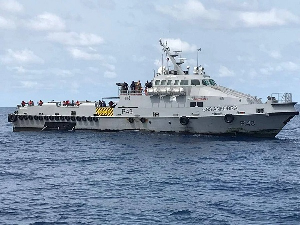The Management of the Regional Maritime University (RMU) in collaboration with the Ghana Navy has designed and constructed a model Sea craft for the Navy.
The project work, if actualized, will be the first locally manufactured fibre plastic and local boat built by a tertiary maritime training and education and in collaboration with the Ghana Navy and the private sector.
Professor Elvis Nyarko, the Vice Chancellor, RMU speaking at the presentation ceremony of a project work report by Naval Architectural Applications Students of the University said it demonstrated the importance of collaboration between the academia military and the industry to work together to find solutions to societal needs.
The project presentation was on the topic: “Construction of a Fibre Reinforce Plastic (FRP) Boat for the Snake Class of Ships for the Ghana Navy” undertaking by Naval Officers sponsored to pursue a tailored-made programme in Naval Architecture Applications.
The Naval Officers, who designed and built the sea craft, are Lieutenant Christopher Nii Affah, Lieutenant Eli Kofi Djamesi and Lieutenant Kofi Tabi Ankobiah.
He said the goal of the University was to train students to take up jobs as seafarers and train them to build their own small crafts and ships in this country and in other Member States.
“The University therefore has put in place all the necessary systems over the past five years to enable us to achieve this feat. We are therefore glad to its realization today,” he added.
Prof Nyarko said at the beginning of the 2019/2020 academic year, the Ghana Navy through Beacon Maritime Safety, Security and Logistics Consultancy Services approached the RMU to design bespoke programmes suitable for the Officers of the Navy in the areas of Marine Engineering, Electrical/Electronic Engineering and Naval Architecture.
He said a key request was to train the officers to be able to build their own Sea Craft, which was the vision of the current Chief of Naval Staff, Rear Admiral Seth Amoama, himself a Naval Architect.
He said towards this end, the Departments of Marine Engineering and Electrical/Electronic Engineering with the facilitation of Mr Augustus Addy-Lamptey, former Provost, designed the programmes, made up of Marine Engineering Applications, Electrical/Electronic Engineering Applications and Naval Architecture Applications.
He said students for these programmes had their practical work done in collaboration with TEAMWORK BOAT, a local Ghanaian boatbuilding company.
“Therefore, given the opportunity, RMU is capable of training students from Ghana and other Member States to be able to design and build sea crafts for the benefit of their countries,” he said.
He called on other organizations in Member States and beyond to emulate the noble example of the Ghana Navy, while they expected the second batch to come soon.
Rear Admiral Seth Amoama, the Chief of Naval Staff commended the students for the great work in designing and building the sea craft and expressed the hope that the Navy would actualize the model boat into a real one.
He also commended the management of RMU for providing their facilities to pilot the programme.
Lt Affah told the Ghana News Agency that the Ghana Navy was challenged with the maintenance of its sea boats, the core equipment used in carrying out boarding operations and most of its sea boats were made of FRP which were imported from overseas draining them financially.
As part of their recommendations, he said the relocation of the teamwork power boat was limited to RMU in order to carry out training and experiences to students and the boat design short courses should be established at the University, since that was the basics of the construction process.
He said the Naval Officers needed to be trained on the design and construction of FRP boat for easy and faster replacement of worn out ones.
He called for collaboration between Ghana Navy, RMU, Ghana Maritime Authority and other stakeholders in the maritime industry to establish regulations to replace wooden boats within Ghanaian waters with FRP boat.
General News of Sunday, 26 July 2020
Source: GNA













